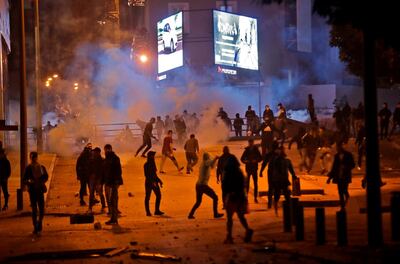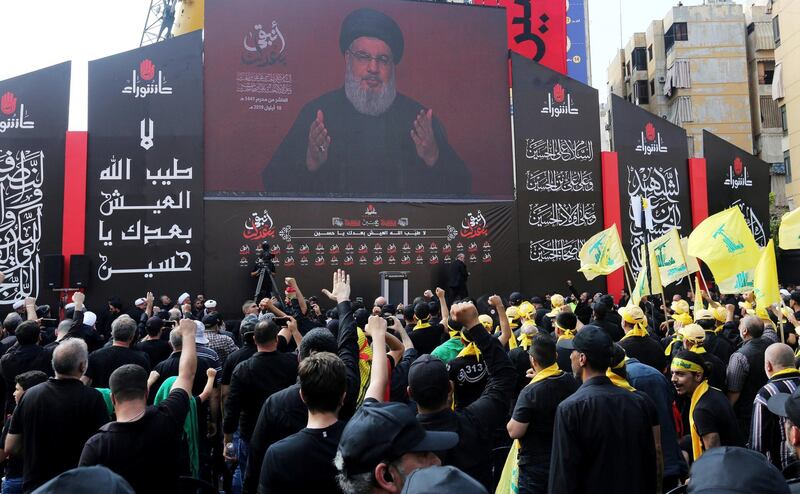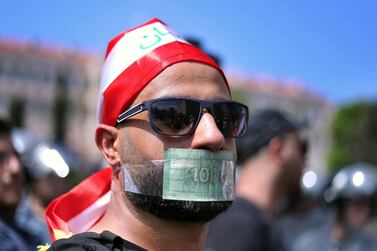The same day that Hezbollah leader Hassan Nasrallah delivered a televised address on the crisis in Lebanon and harangued the United States, Washington released fresh sanctions on two of the Iran-backed group’s most ostentatious moneymen.
The pair, one based in Lebanon and the other in the Democratic Republic of the Congo, were listed as money launderers using companies “to generate tens of millions of dollars for Hezbollah, its financiers and their malign activities,” the US Treasury said on Friday.
“These designations underscore the extent to which Hezbollah and its affiliates engage in illicit economic activity that prioritises the terrorist group’s own economic interests over those of the Lebanese people,” the Treasury added.
The statement also said that Washington supports the Lebanese people’s demands to end corruption and terror financing that thrives in corrupt environments as two months of anti-government demonstrations continue on the streets in Lebanon.
The statement named the pair as Lebanon-based diamond dealer Nazem Said Ahmad and DRC-based businessman Saleh Assi. Mr Ahmad was accused of involvement in “blood diamond” smuggling.
Mr Assi’s assets, including a 7.95 million euro (Dh 32.5 million), 44.8-metre luxury racing yacht named the Flying Dragon, were also listed as blocked property.
The US alleges that Mr Assi used a network of DRC companies to funnel money to Adham Tabaja, a previously sanctioned Hezbollah money-launderer. Either the money went through bulk cash transfers or through Ahmad’s diamond business, the Treasury said.
“Hezbollah continues to use seemingly legitimate businesses as front companies to raise and launder funds in countries like the DRC where it can use bribery and political connections to secure unfair market access and evade taxes,” said Secretary Steven Mnuchin.
“This Administration will continue to take action against Hezbollah financiers like Nazem Said Ahmad and Saleh Assi, who have used money laundering and tax evasion schemes to fund terrorist plots and finance their own lavish lifestyles as the Lebanese people suffer.”
Responding to the sanctions, Assi on Saturday denied any involvement in the funding of political parties.
“I absolutely deny all that was reported on my involvement in financing political parties, people or companies that are on the sanctions list … I stress that my business is clear and my companies work according to transparent international criteria,” Assi said in a statement.
Assi said he had initiated legal proceedings to contest the decision, adding that Saab “is an accountant at our company and has no shares in our business”.
Washington also said that Ahmad hid his illicit wealth by buying expensive art, building a collection worth tens of millions of dollars that he displayed in his Beirut penthouse.
These included works by Pablo Picasso and Andy Warhol. The US Treasury shared an image of Ahmad sitting in front of a collection of works taken as part of an interview earlier this year with Selections Arts magazine.
In the interview, Ahmad also said he owns works by famed Chinese critic and artist Ai Weiwei as well as graffiti artist Jean-Michel Basquiat.
“In concealing his ill-gotten gains from the Lebanese government, Ahmad has deprived the government and the Lebanese people of much-needed tax revenue while the country faces serious economic challenges,” the statement said.
Deputy Treasury Secretary Justin Muzinich also issued a warning to the art world, saying “art and luxury goods dealers should be on alert to the schemes of money launderers who hide personal funds in high-value assets in an attempt to mitigate the effects of US sanctions.”
A third man, Tony Saab, who works for Assi was also sanctioned for assisting in the transfer millions of dollars from two of his bosses’ companies – Inter Aliment and Minocongo – to Lebanon.
The measures taken by Washington mean it is now illegal for any US company or citizen to do business with any of the listed persons and entities and also blocks all US assets and property or face sanctions of their own.
The measures were announced as Hezbollah’s Nasrallah gave a speech on the situation in Lebanon. He began by criticising the US for statements on the protests, saying that Washington intervenes around the world and had sought to co-opt the movement on the streets from the very beginning.

He said America and Israel were seeking to solve the issues they see in Lebanon through the mass rallies on the streets.
Since October 17, protesters have been demanding a complete change of governance with a new cabinet of experts to set about fixing the dire economic situation, rebuild the country’s crumbling infrastructure and combat corruption.







